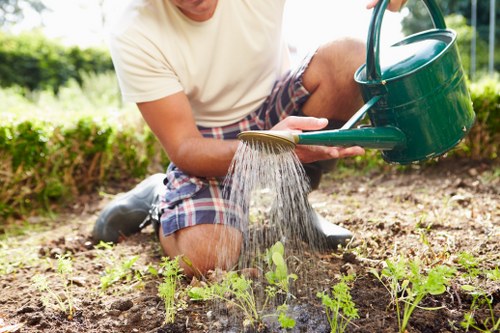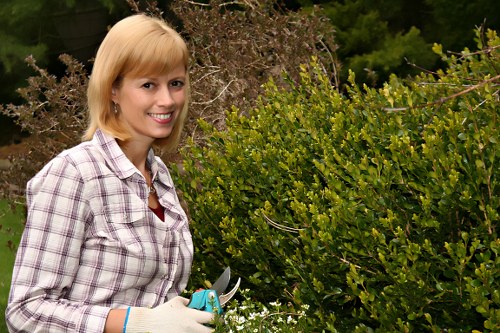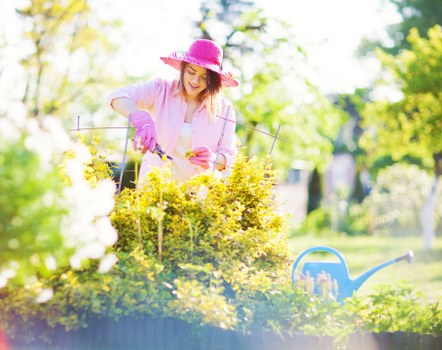Comprehensive Guide to Garden Maintenance in Stockwell
 Maintaining a beautiful garden in Stockwell requires dedication, knowledge, and the right strategies. Whether you're a seasoned gardener or a beginner, understanding the unique aspects of garden maintenance in this vibrant London area can help your garden thrive throughout the seasons.
Maintaining a beautiful garden in Stockwell requires dedication, knowledge, and the right strategies. Whether you're a seasoned gardener or a beginner, understanding the unique aspects of garden maintenance in this vibrant London area can help your garden thrive throughout the seasons.
Stockwell's climate presents both opportunities and challenges for garden enthusiasts. With its temperate weather, you can enjoy a variety of plants, but it's essential to be mindful of local pests and diseases. Effective garden maintenance involves regular care, proper plant selection, and timely interventions to ensure your garden remains healthy and picturesque.
 One of the key aspects of garden maintenance in Stockwell is soil management. The quality of your soil directly impacts the growth and health of your plants. Conducting soil tests can help determine the pH level and nutrient composition, allowing you to amend the soil as needed. Adding organic matter, such as compost, can improve soil structure, drainage, and fertility, promoting robust plant growth.
One of the key aspects of garden maintenance in Stockwell is soil management. The quality of your soil directly impacts the growth and health of your plants. Conducting soil tests can help determine the pH level and nutrient composition, allowing you to amend the soil as needed. Adding organic matter, such as compost, can improve soil structure, drainage, and fertility, promoting robust plant growth.
Seasonal Garden Care
Adapting your garden maintenance routines to the changing seasons is crucial for sustained garden health. Each season brings its own set of tasks and considerations:
- Spring: Prepare your garden for the growing season by pruning dead branches, planting new seedlings, and applying fertilizers.
- Summer: Focus on watering, weeding, and protecting plants from excessive heat and pests.
- Autumn: Harvest remaining produce, clear fallen leaves, and prepare plants for the winter months.
- Winter: Implement protective measures for sensitive plants and plan for the upcoming growing season.
By aligning your maintenance activities with the seasons, you can ensure that your garden remains vibrant and productive year-round.
 Proper watering techniques are fundamental to effective garden maintenance in Stockwell. Understanding the water needs of different plants and adopting efficient irrigation methods can conserve water and promote healthy growth. Drip irrigation systems, for instance, deliver water directly to the plant roots, minimizing evaporation and runoff. Additionally, mulching around plants helps retain soil moisture and regulate temperature, reducing the frequency of watering required.
Proper watering techniques are fundamental to effective garden maintenance in Stockwell. Understanding the water needs of different plants and adopting efficient irrigation methods can conserve water and promote healthy growth. Drip irrigation systems, for instance, deliver water directly to the plant roots, minimizing evaporation and runoff. Additionally, mulching around plants helps retain soil moisture and regulate temperature, reducing the frequency of watering required.
Pest and Disease Management
Gardeners in Stockwell often encounter a variety of pests and diseases that can threaten their plants. Early detection and proactive management are essential to prevent infestations from spreading. Regularly inspecting your plants for signs of damage or distress allows you to address issues promptly. Integrated Pest Management (IPM) strategies, which combine biological, cultural, and chemical controls, offer sustainable solutions for pest control without harming beneficial insects.
Choosing disease-resistant plant varieties is another effective strategy in maintaining a healthy garden. Additionally, promoting good air circulation and proper spacing between plants can reduce the likelihood of fungal infections and other diseases.
 Implementing natural remedies and organic treatments can further enhance your pest and disease management efforts. For example, neem oil is a versatile organic pesticide that can deter a wide range of pests. Companion planting, where certain plants are grown together to repel pests, also contributes to a balanced and resilient garden ecosystem.
Implementing natural remedies and organic treatments can further enhance your pest and disease management efforts. For example, neem oil is a versatile organic pesticide that can deter a wide range of pests. Companion planting, where certain plants are grown together to repel pests, also contributes to a balanced and resilient garden ecosystem.
Pruning and Trimming Techniques
Regular pruning and trimming are vital components of garden maintenance in Stockwell. These practices help shape plants, encourage healthy growth, and prevent the spread of diseases. Different plants require specific pruning techniques, so it's important to understand the needs of each species in your garden.
For flowering plants, removing dead or spent blooms can promote the production of new flowers and improve the overall appearance of the garden. Thinning out overcrowded branches allows for better air circulation and light penetration, which are essential for plant health.
 When pruning trees and shrubs, use sharp and clean tools to make precise cuts that minimize damage to the plant. It's also advisable to prune during the appropriate season for each plant type, typically in late winter or early spring, before the onset of new growth.
When pruning trees and shrubs, use sharp and clean tools to make precise cuts that minimize damage to the plant. It's also advisable to prune during the appropriate season for each plant type, typically in late winter or early spring, before the onset of new growth.
Weed Control Strategies
Weeds compete with your garden plants for essential nutrients, water, and light, making effective weed control a critical aspect of garden maintenance in Stockwell. Regular weeding helps maintain a tidy garden and prevents weeds from becoming established and spreading.
Manual weeding is a straightforward method, especially for small gardens, but it can be time-consuming. Mulching, as mentioned earlier, not only conserves soil moisture but also suppresses weed growth by blocking sunlight. Additionally, using landscape fabrics can provide a barrier that inhibits weed emergence while allowing air and water to reach the soil.
For larger gardens, mechanical or chemical weed control methods may be necessary. However, it's important to use herbicides responsibly to avoid harming desirable plants and the surrounding environment.
Soil Health and Fertilization
Maintaining healthy soil is the foundation of successful garden maintenance in Stockwell. Healthy soil supports strong root systems, facilitates nutrient uptake, and enhances plant resilience against pests and diseases.
Regularly adding organic matter, such as compost or well-rotted manure, enriches the soil with essential nutrients and beneficial microorganisms. Crop rotation and cover cropping are also effective practices for maintaining soil fertility and preventing nutrient depletion.
Fertilization: Selecting the right fertilizer based on your soil test results ensures that your plants receive the necessary nutrients without over-fertilizing, which can lead to salt buildup and other issues. Organic fertilizers, like fish emulsion or bone meal, provide a slow-release source of nutrients that improve soil structure over time.
Mulching Benefits
Mulching is a versatile practice that contributes to multiple aspects of garden maintenance. By applying a layer of mulch around your plants, you can:
- Retain soil moisture, reducing the need for frequent watering.
- Suppress weed growth, minimizing competition for resources.
- Regulate soil temperature, protecting roots from extreme heat or cold.
- Improve soil structure as organic mulches decompose.
There are various types of mulch available, including organic options like bark, straw, and compost, as well as inorganic options like gravel and black plastic. Choosing the right mulch depends on your garden's specific needs and aesthetic preferences.
Choosing the Right Mulch: Organic mulches are generally preferred for their ability to enrich the soil as they break down. However, inorganic mulches may be suitable for certain applications where decomposition is not desired.
Lawn Care and Maintenance
A well-maintained lawn enhances the overall appearance of your garden and provides a versatile space for relaxation and play. In Stockwell, lawn care involves proper mowing, watering, fertilizing, and aerating to keep the grass healthy and lush.
Mowing regularly at the appropriate height encourages denser grass growth and prevents weeds from taking hold. Watering early in the morning minimizes evaporation and reduces the risk of fungal diseases. Aerating the soil annually helps alleviate compaction, allowing air, water, and nutrients to penetrate deeper into the root zone.
Grass Types: Selecting the right type of grass for your lawn is crucial. Consider factors like sunlight exposure, foot traffic, and maintenance requirements when choosing between cool-season grasses like fescue or warm-season varieties like Bermuda grass.
Garden Tools and Equipment
Having the right tools and equipment is essential for efficient garden maintenance in Stockwell. Invest in high-quality tools that are comfortable to use and suited to your specific gardening tasks.
Basic tools include:
- Hand trowel: Ideal for planting and transplanting small plants.
- Pruning shears: Essential for trimming and shaping plants.
- Garden fork: Useful for turning and aerating the soil.
- Watering can or hose: Necessary for providing adequate moisture to your plants.
Maintaining your tools by cleaning and sharpening them regularly extends their lifespan and ensures they perform effectively when needed.
 Additionally, consider investing in power tools like lawnmowers, hedge trimmers, and leaf blowers for larger gardens. These tools can significantly reduce maintenance time and effort, allowing you to focus on other aspects of garden care.
Additionally, consider investing in power tools like lawnmowers, hedge trimmers, and leaf blowers for larger gardens. These tools can significantly reduce maintenance time and effort, allowing you to focus on other aspects of garden care.
Plant Selection and Diversity
Choosing a diverse array of plants enhances the beauty and resilience of your garden. In Stockwell, selecting plant species that are well-suited to the local climate and soil conditions is essential for successful garden maintenance.
Diversity in plant selection not only creates an aesthetically pleasing environment but also supports biodiversity by attracting pollinators and beneficial insects. Incorporate a mix of perennials, annuals, shrubs, and trees to create layers of interest and ensure continuous blooms throughout the seasons.
Native Plants: Incorporating native plant species can simplify garden maintenance, as these plants are adapted to the local environment and more resistant to pests and diseases. Additionally, native plants contribute to the local ecosystem by providing habitat and food sources for wildlife.
Sustainable Gardening Practices
Adopting sustainable gardening practices not only benefits the environment but also enhances the long-term health of your garden. Implementing these practices in Stockwell can lead to a more resilient and eco-friendly garden:
- Rainwater harvesting: Collecting and storing rainwater for garden use reduces reliance on municipal water supplies and minimizes water waste.
- Composting: Recycling kitchen and garden waste into compost enriches the soil and reduces landfill contributions.
- Integrated Pest Management (IPM): Combining biological, cultural, and mechanical pest control methods minimizes the use of chemical pesticides.
- Organic gardening: Avoiding synthetic fertilizers and pesticides supports soil health and reduces environmental impact.
By integrating these sustainable practices, you can create a garden that is both beautiful and environmentally responsible.
Winterizing Your Garden
Preparing your garden for the winter months is a crucial aspect of garden maintenance in Stockwell. Proper winterization protects your plants from frost, snow, and other harsh conditions, ensuring they emerge healthy in the spring.
Key winterizing practices include:
- Mulching: Apply a thick layer of mulch to insulate plant roots and retain soil moisture.
- Pruning: Remove dead or damaged branches to prevent breakage under snow and ice.
- Covering: Use frost blankets or garden fabric to shield sensitive plants from extreme cold.
- Watering: Ensure plants are adequately hydrated before the ground freezes to prevent desiccation.
Additionally, storing garden tools and equipment in a dry, sheltered area protects them from the elements and extends their lifespan.
 Planning for the next growing season by ordering seeds and preparing garden layouts can help you start fresh when spring arrives.
Planning for the next growing season by ordering seeds and preparing garden layouts can help you start fresh when spring arrives.
Conclusion
Effective garden maintenance in Stockwell involves a combination of careful planning, regular care, and sustainable practices. By understanding the local climate, selecting appropriate plants, managing soil health, and implementing proper maintenance routines, you can create a thriving and beautiful garden.
Embrace the Joy of Gardening: Gardening is not only a rewarding hobby but also a way to connect with nature and enhance your living space. With dedication and the right knowledge, your garden in Stockwell can become a source of pride and enjoyment for years to come.
 Remember, every garden is unique, and ongoing learning and adaptation are key to successful garden maintenance. Happy gardening!
Remember, every garden is unique, and ongoing learning and adaptation are key to successful garden maintenance. Happy gardening!
